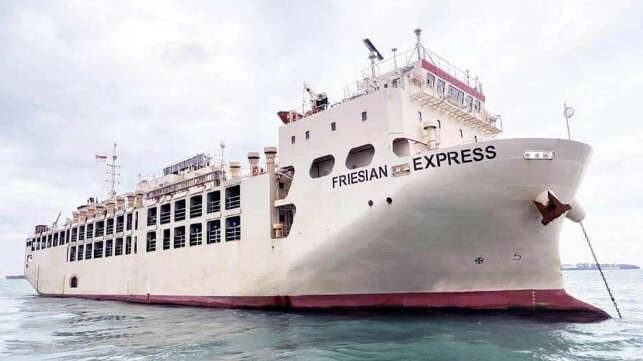Dutch Company Vroon Expands Livestock Fleet Despite Efforts to End Trade

The Dutch shipping company Vroon is reporting that it expanded its livestock carrier fleet with the acquisition of its thirteenth dedicated vessel. The company highlights its use of modern ships and the highest standards but the industry continues to face broad calls for an immediate end due to inhuman conditions.
Based in Singapore, the company’s Livestock Express division is promoted as the world’s largest provider of premium livestock tonnage. Unlike many of the operators that use old, converted, and often poorly suited and maintained vessels, Vroon highlights that it has a modern, purpose-built fleet of carriers. They report transporting as many as 750,000 head of livestock annually, including cattle, sheep, horses, and goats.
Activists in both New Zealand and Australia continue to push for the end to live export. They cite the long history of poor conditions and low safety records of the ships, which have led to seasonal bans and requirements such as having a licensed veterinarian and trained handlers aboard as well as required amounts of feed and medicine. Lobbyists for the industry and the ranchers cite the improvements pushing for an end to the restrictions.
Vroon reports against this backdrop that it acquired a new ship, the Aurochs from Japan’s Tsuneishi Group. Renamed Friesian Express, the vessel departed Australia on January 23 with its AIS showing it was heading to Pakistan. The vessel was purpose-built in 2017 by Zhoushan Shipbuilding. It is registered in Portugal and 4,600 dwt with reports that it has a capacity for approximately 2,300 cattle.

that matters most
Get the latest maritime news delivered to your inbox daily.
They highlight that fewer than 20 purpose-built livestock vessels have entered the worldwide fleet throughout history, of which 13 were designed and built for Livestock Express. The new acquisition is the youngest vessel in the company’s fleet which also has three vessels built in the late 1990s. The others were mostly built as part of a fleet renewal between 2013 and 2016 with the company saying the new ships are better designed for a comfortable ride, cargo handling, and ventilation.
Management highlights the acquisition is part of a new effort to strengthen the company’s operations in its key sectors which also include offshore and tankers, after completing a financial restructuring last year. Critics however are surprised by the decision to expand the livestock operation as animal rights groups work passionately to end the trade. RSPCA Australia reported in September it had made significant progress receiving 44,000 signatures on a Parliamentary petition calling for a legislated end date to live sheep export. They reported that 78 percent of Australians supported phasing out the trade as long as there was support for the impacted farmers.
